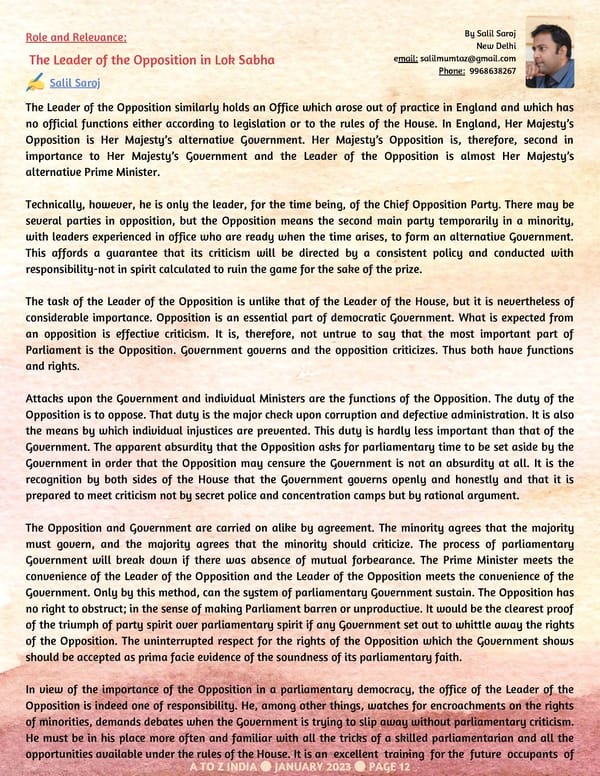Salil Saroj The Leader of the Opposition similarly holds an Office which arose out of practice in England and which has no official functions either according to legislation or to the rules of the House. In England, Her Majesty’s Opposition is Her Majesty’s alternative Government. Her Majesty’s Opposition is, therefore, second in importance to Her Majesty’s Government and the Leader of the Opposition is almost Her Majesty’s alternative Prime Minister. Technically, however, he is only the leader, for the time being, of the Chief Opposition Party. There may be several parties in opposition, but the Opposition means the second main party temporarily in a minority, with leaders experienced in office who are ready when the time arises, to form an alternative Government. This affords a guarantee that its criticism will be directed by a consistent policy and conducted with responsibility-not in spirit calculated to ruin the game for the sake of the prize. The task of the Leader of the Opposition is unlike that of the Leader of the House, but it is nevertheless of considerable importance. Opposition is an essential part of democratic Government. What is expected from an opposition is effective criticism. It is, therefore, not untrue to say that the most important part of Parliament is the Opposition. Government governs and the opposition criticizes. Thus both have functions and rights. Attacks upon the Government and individual Ministers are the functions of the Opposition. The duty of the Opposition is to oppose. That duty is the major check upon corruption and defective administration. It is also the means by which individual injustices are prevented. This duty is hardly less important than that of the Government. The apparent absurdity that the Opposition asks for parliamentary time to be set aside by the Government in order that the Opposition may censure the Government is not an absurdity at all. It is the recognition by both sides of the House that the Government governs openly and honestly and that it is prepared to meet criticism not by secret police and concentration camps but by rational argument. The Opposition and Government are carried on alike by agreement. The minority agrees that the majority must govern, and the majority agrees that the minority should criticize. The process of parliamentary Government will break down if there was absence of mutual forbearance. The Prime Minister meets the convenience of the Leader of the Opposition and the Leader of the Opposition meets the convenience of the Government. Only by this method, can the system of parliamentary Government sustain. The Opposition has no right to obstruct; in the sense of making Parliament barren or unproductive. It would be the clearest proof of the triumph of party spirit over parliamentary spirit if any Government set out to whittle away the rights of the Opposition. The uninterrupted respect for the rights of the Opposition which the Government shows should be accepted as prima facie evidence of the soundness of its parliamentary faith. In view of the importance of the Opposition in a parliamentary democracy, the office of the Leader of the Opposition is indeed one of responsibility. He, among other things, watches for encroachments on the rights of minorities, demands debates when the Government is trying to slip away without parliamentary criticism. He must be in his place more often and familiar with all the tricks of a skilled parliamentarian and all the opportunities available under the rules of the House. It is an excellent training for the future occupants of The Leader of the Opposition in Lok Sabha Role and Relevance: A TO Z INDIA ● JANUARY 2023 ● PAGE 12 By Salil Saroj New Delhi e mail: [email protected] Phone: 9968638267
 A TO Z INDIA - JANUARY 2023 Page 11 Page 13
A TO Z INDIA - JANUARY 2023 Page 11 Page 13